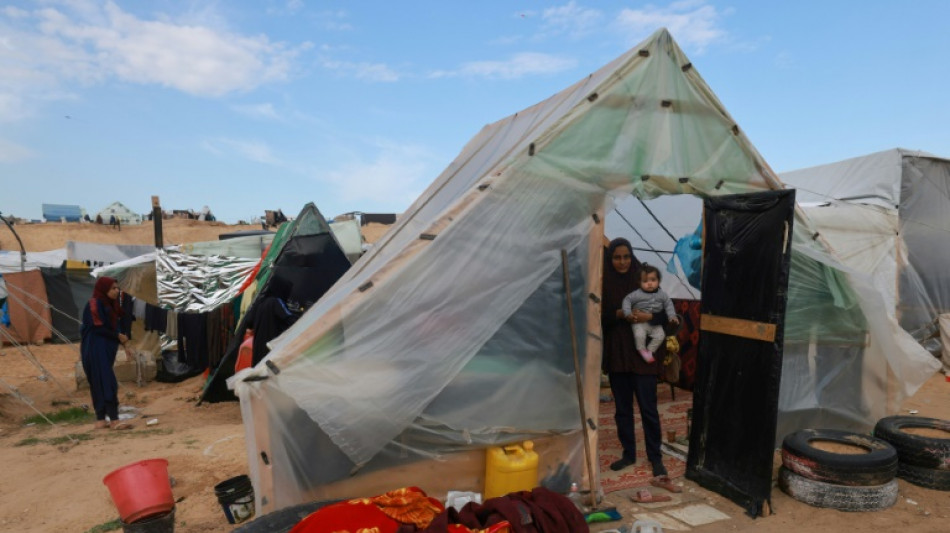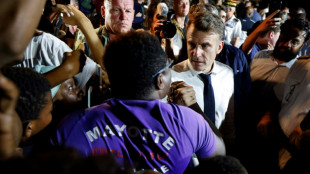

Alarm over fate of major Gaza hospital after Israeli raid
There was growing concern Friday over a key Gaza hospital a day after a raid by the Israeli army, with the Hamas-run health ministry saying several patients had died there due to a lack of oxygen.
The health ministry said the power was cut off and the generators stopped after the raid at the Nasser hospital in the southern city of Khan Yunis, and that four patients had died Friday.
In recent days, intense fighting has raged in the vicinity of the hospital -- one of the Palestinian territory's last remaining major medical facilities that are still operational.
On Thursday Israeli army spokesman Daniel Hagari said there was "credible intelligence" to suggest hostages seized by Gaza militants in the October 7 attack that sparked the war had been held at the hospital, and that bodies of some of the captives may still be inside.
But the military said later it had "not yet found any evidence of this", although forces had found "weapons, grenades and mortar bombs" at the hospital complex.
On Friday it said Israeli forces had taken into custody more than "20 terrorists" suspected of involvement in the October 7 attack at the hospital.
A witness who declined to be named out of fear for their safety told AFP the army had shot "at anyone who moved inside the hospital".
The health ministry also raised fears over the fate of six other patients in the intensive care unit and three children, saying it held Israel "responsible for the lives of patients and staff considering that the complex is now under its full control".
- 'Pattern of attacks' -
Medical charity Doctors Without Borders described a "chaotic situation" at the hospital, with one employee unaccounted for and another detained by Israeli forces.
"Our medical staff have had to flee the hospital, leaving patients behind," it said.
Footage circulating on social media, which AFP could not independently verify, showed rescuers trying to move patients through dust-filled corridors amid fallen debris.
On Friday the Israeli army did not reference the hospital or hostage claims, but said it had carried out "targeted raids" and killed "12 terrorists during encounters" in Khan Yunis.
Roughly 130 hostages are still believed to be in Gaza after the October 7 attack on Israel by Hamas militants, which resulted in the deaths of about 1,160 people, mostly civilians, according to an AFP tally based on official Israeli figures.
Dozens of the estimated 250 hostages seized during the attack were freed in exchange for Palestinian prisoners during a week-long truce in November.
Israel says 30 of those still in Gaza are presumed dead.
At least 28,775 people, mostly women and children, have been killed in Israel's assault on the Palestinian territory, according to the health ministry.
The UN Human Rights Office said Israel's raid on the Nasser hospital appeared to be "part of a pattern of attacks by Israeli forces striking essential life-saving civilian infrastructure in Gaza, especially hospitals".
The World Health Organization has described the Nasser hospital as a critical facility "for all of Gaza", where only a minority of hospitals are even partly operational.
Israeli strikes continued in the besieged territory overnight, with the Hamas-run health ministry saying Friday another 112 people were killed.
Israel's army on Friday reported the death of another soldier in Gaza, raising the number killed in the ground operation to 234.
- 'Dying slowly' -
Nearly 1.5 million displaced Palestinians are trapped in Rafah -- more than half of Gaza's population -- seeking shelter in a sprawling makeshift encampment near the Egyptian border.
"They are killing us slowly," said displaced Palestinian Mohammad Yaghi. "We are dying slowly due to the scarcity of resources and the lack of medications and treatments in the city of Rafah."
"There is no medicine," said Jihan al-Quqa, who was displaced from Khan Yunis to Rafah.
"There are no antibiotics or any other treatments," she added.
"Everyone is sick, children and the elderly, and there is no medicine."
US President Joe Biden spoke by phone with Israeli Prime Minister Benjamin Netanyahu late Thursday, the White House said, and urged him again not to carry out an attack on Rafah without a plan to keep civilians safe.
Britain, Australia, Canada and New Zealand have also urged Israel not to launch a ground offensive in the city.
Despite international pressure, Netanyahu has insisted he would push ahead with a "powerful" operation in the overcrowded city to achieve "complete victory" over Hamas.
Media reports suggested Egyptian authorities were building a new wall near the frontier with Gaza, amid fears of an influx of refugees.
- Truce talks -
Mediators from the United States, Qatar and Egypt gathered in Cairo this week to try and broker a deal to halt the fighting and see the release of the remaining hostages in exchange for Palestinian prisoners held by Israel.
CIA director Bill Burns made an unannounced visit to Israel Thursday for talks with Netanyahu and the head of Israel's Mossad intelligence agency, David Barnea.
Barnea had already held talks with Burns and Egyptian and Qatari representatives in Cairo on Tuesday, before a Hamas delegation visited Wednesday.
US Secretary of State Antony Blinken said he believed an agreement was still "possible".
Netanyahu's office said it had not received "any new proposal" from Hamas about releasing hostages, and Israeli media reported the country's delegation would not return to negotiations until Hamas softened its stance.
Netanyahu also said Thursday he rejected a plan for international recognition of a Palestinian state, following reports of the move in The Washington Post.
burs-rox/dv
Ch.Mayr--MP




